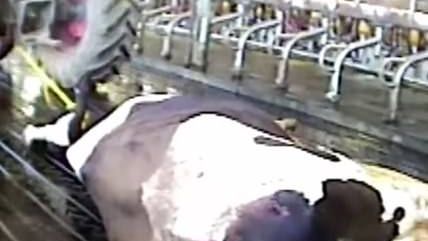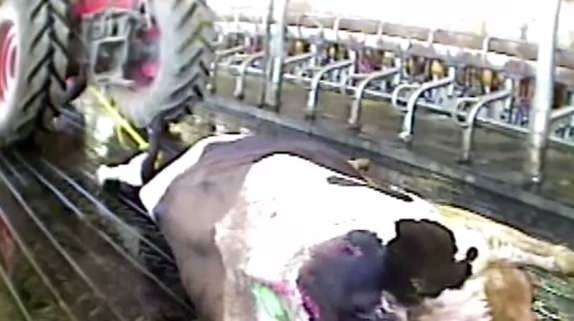Judge Strikes Down Idaho's 'Ag Gag' Law as Unconstitutional
Dairy protection legislation criminalized secret filming of abusive treatment of farm animals.


In a ruling both welcome and obvious, a federal judge has ruled that Idaho's law criminalizing the secret filming of animal abuse at farms and agricultural facilities is an unconstitutional violation of free speech.
Here's how U.S. District Judge B. Lynn Mill described the law's impact in the ruling (pdf):
Under the law, a journalist or animal rights investigator can be convicted for not disclosing his media or political affiliations when requesting a tour of an industrial feedlot, or applying for employment at a dairy farm. … An employee can be convicted for videotaping animal abuse or life-threatening safety violations at an agricultural facility without first obtaining the owner's permission. … Any person who violates the law—whether an animal rights' investigator, a journalist, or an employee—faces up to a year in jail. In addition, a journalist or whistleblower convicted under the law can be forced to pay publication damages pursuant to a restitution provision that requires payment for "twice" the "economic loss" a business suffers as a result of any exposé revealing animal abuse or unsafe working conditions.
In other words, [the law] seeks to limit and punish those who speak out on topics relating to the agricultural industry, striking at the heart of important First Amendment values. The effect of the statute will be to suppress speech by undercover investigators and whistleblowers concerning topics of great public importance: the safety of the public food supply, the safety of agricultural workers, the treatment and health of farm animals, and the impact of business activities on the environment. Indeed, private party media investigations, such as investigative features on 60 Minutes, are a common form of politically salient speech. A review of Idaho media reports in recent years reveals a range of undercover investigations from life on the streets, to wolf-hunting contests, to family planning services, to public-school safety. Such investigations into private matters, both by government and private actors, are recognized and embraced as important political speech in Idaho.
The judge notes that the proponents of the law have openly declared that its purpose is to protect the dairy industry from undercover investigation and references Upton Sinclair's The Jungle and how it exposed terrible conditions in Chicago stockyards. Under such a law, Sinclair would face prosecution for misrepresenting himself to get access. The judge also points out that laws against trespassing, fraud, theft, and defamation already exist: "These types of laws serve the property and privacy interests the State professes to protect through the passage of [the ag gag law], but without infringing on free speech rights."
I have to wonder if there's a potential Venn diagram of those who would celebrate this decision but want California and the Department of Justice to throw the book at the Center for Medical Process or support judicial censorship for their secret filming and release of videos about how Planned Parenthood treats fetal tissue. I also have to wonder if there's a reverse Venn diagram of those who are outraged at animal rights activists secretly filming and distributing images of cattle abuse but nevertheless hold the Center of Medical Process up as heroes.
The Idaho Statesman notes that seven states currently have "ag gag" laws. Idaho's is the first to be struck down. We will have to see if others follow.
Keep Food Legal's Baylen Linniken has written at Reason how "ag gag" laws suppress free speech. Read what he had to say here.



Show Comments (52)